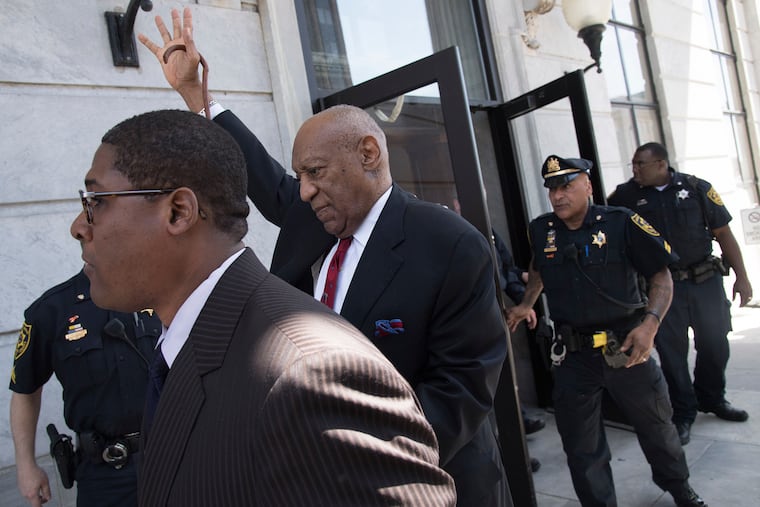What black Philadelphians see in the Cosby verdict
As Bill Cosby's legacy is contemplated, questions flow over his guilt or innocence — and the fairness of the process.

When it comes to Bill Cosby, Patricia Haines is on the fence.
Haines, an administrative assistant at School District headquarters, was coming up from the subway when she saw the news on her phone. She sorted through her thoughts while waiting for a bus at Broad and Erie. Cosby, in her view, deserved to be in court to face sexual-assault allegations. But something still pulled at her about his fall from grace.
"It's very unfair because there's a lot of people who've done the things that he's done, or more, and not had their accolades stripped from them," said Haines, who added that she doesn't believe that a white man facing the same accusations would have had the same experience. "Not saying that rape is OK, but that doesn't take away from what he's done for the community, for colleges, for the culture."
>>READ MORE: Bill Cosby guilty of sexual assault
A Montgomery County jury found Cosby guilty Thursday on all three counts of aggravated indecent assault. As black Philadelphians contemplate his legacy, questions flow over his guilt or innocence and the fairness of the process. Amid the stream come memories of a trailblazing career and the comedian's prowess as an education advocate and philanthropist with contributions that often boosted his hometown.
Duke University professor Mark Anthony Neal suggested that what was at work in the variety of reactions was a "much more complicated divide" within the black community, both a generational and a gender chasm:
"An older generation of African Americans are much more sympathetic to Mr. Cosby as opposed to a younger generation that don't have that long history of seeing him on their television screens since [the television show] 'I Spy."
Michelle Taylor, 39, a popular local writer and activist known as Feminista Jones, said by phone that she was pleased with the verdict.
"I am very happy that justice was finally served for somebody," said Taylor, who shared that while she had survived sexual trauma, she never saw her attacker convicted. "That somebody somewhere gets justice, it affects you personally."
>>READ MORE: Cosby is guilty. What happens next?
David Smith, a 65-year-old cook from Nicetown, said he believes that Cosby's main accuser, Andrea Constand, was "lying on him."
"I grew up [watching] Bill Cosby, Jell-O pudding and all that," Smith said at Broad and Erie. "I don't think he did it. He had money, he was married. He had no reason to do it."
Many African American residents were loath Thursday to call the accusers liars outright, yet they still doubted their motives, casting their claims as ploys for cash.
Tiffanee Stokes, a 37-year-old chiropractic assistant from North Philadelphia, sensed that race played a heavy role in the case.
"I just feel like it had more to do with the political climate of the country and the racial aspect than whether or not he was guilty," she said. "I'm not saying [Constand's] lying, I just don't think it was investigated well enough."
Jean Alexander, 54, of Nicetown, said she doubts that the criminal justice functions the same way for black women seeking justice. Cosby's demise, she said, came because so many of his accusers were white.
>>READ MORE: Reactions: "A turning point for the #MeToo movement"
But other locals weren't so bothered. "Second time around, so I guess it's a fair trial," said Rahim Robinson, 40, of Germantown. "Women are finally having a voice on their own, they're standing up for what's right."
Haines, the School District employee, noted that Cosby is exceptional, a native son who enjoyed incredible success, moving in a stratosphere of power that few blacks inhabit. On one side, this raises anxieties that he was unfairly treated because of his fame. In other sectors of the community, Cosby's politics are viewed critically. Taylor's views are influenced by the classism and colorism she sees in The Cosby Show. Anthea Butler, a Penn religious-studies professor, argues that Cosby was a purveyor of harmful respectability politics.
Taylor has observed that many black women are experiencing a particular conflict: balancing their volume of accusations with their understanding of history. Treva B. Lindsey, an Ohio State University women's studies professor, referenced cases of black men being jailed or lynched on false charges of rape or whistling at white women, such as the Scottsboro Boys and Emmett Till. For years, Lindsey said, black women "felt protective of black men."
>>READ MORE: Verdict a warning shot to Harvey Weinstein and others | Maria Panaritis
For the younger contingent, that's changing, Butler said. And the old guard includes black women who couldn't imagine there could be justice for those who had experienced sexual trauma.
"They were not believed," she said. "They were not able to talk. They were not able to get retribution. They didn't have a recourse. Now people do."
People have called Taylor a race traitor for dissing Cosby. She doesn't care. "I think he has done good things for people in need, but he also has done a lot of harm. Those two things can exist at the same time."
Staff writer Valerie Russ contributed to this story.